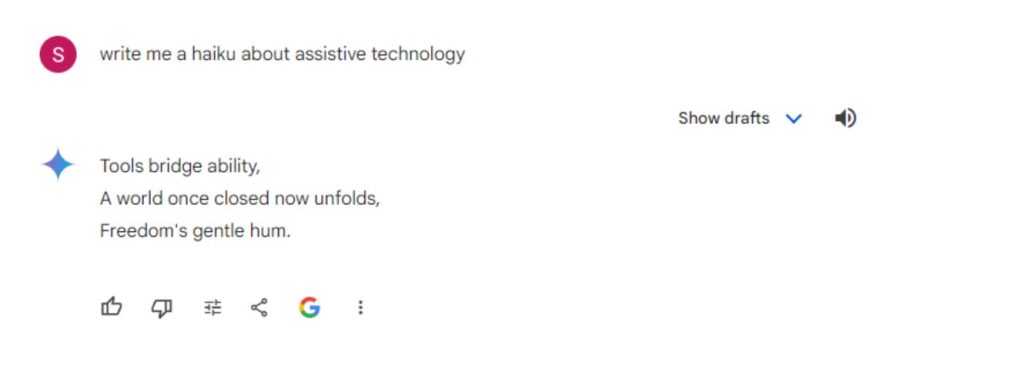Top Three AI Chatbots and How to Use Them

In a previous e-bulletin we started to explore the concept of using AI as AT. We learned that there are many ways in which this new technology can be helpful to students, professionals, persons with disabilities, and beyond. We discovered that AI chatbots were even better at finding and synthesizing information than a traditional browser, and that the flexible, conversational nature of this technology is ideal for diving into a variety of complicated subjects. With that in mind, we are going to dive even deeper into what these chatbots are capable of as well as identifying and comparing the top three chatbots on the market right now.
Copilot
Copilot is a powerful AI tool that clearly makes good use of Microsoft’s vast repository of information. And while the app is perfectly capable of creating stories and songs and other creative elements, coding is where it shines above the rest. With instant access to GitHub (an open source coding platform), Copilot is able to suggest and create complex strings of code, thus saving developers and students hours and hours of work.
Gemini
Formally known as Bard, Gemini is Google’s entry into the world of chatbots. As the former name suggests, the app is great at creating original content that ranges from complex code to flowery poetry. It also does both of those things very well, so you could say that Gemini is a bit of a “jack of all trades” within the world of AI chatbots. Gemini also boasts a particularly interesting feature that the other chatbots do not yet have. With this app, users can actually upload photos instead of text as a prompt. In testing this feature, I uploaded a picture I had taken of two iPhones and asked, “What is this?”. The AI correctly identified the two phones and even compared the unique features that each phone possessed.
ChatGPT
If you’re looking for someone to talk to, ChatGPT is the winner. This app excels at conversation and is the best choice for creating text that actually seems like it might have come from a human. If you are looking at creating or editing written content, ChatGPT is the best choice. The app also does a fantastic job of breaking down complex information into digestible and well-formatted chunks of text. I find this app does the best job of providing users with the information they need without being bogged down with too many superfluous details.
In terms of built-in accessibility, Gemini and Copilot both offer built-in speech-to-text functionality whereas ChatGPT does not. On the other hand, ChatGPT offers a built-in read aloud feature where the other two do not. But since read aloud can be toggled via Edge, this isn’t much of an advantage accessibility-wise, which puts Gemini and Copilot ahead of ChatGPT when it comes to overall accessibility. To explore these apps even further, click the bolded titles above to be redirected to each respective chatbot.
This post originally appeared on the AT Help Desk website.
Tags: apps, assistive technology, AT HelpDesk, Atlantic Regional Office




